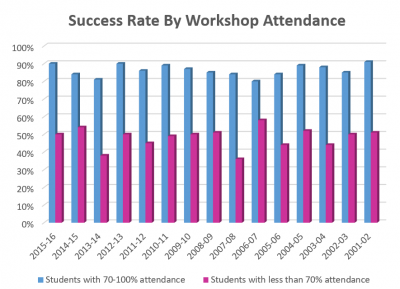- What are ESP workshops for?
-
As an ESP student, you will have the advantage of a weekly ESP workshop to help with each of your elective courses.
You’ll attend the same lectures, labs, and tutorials as other Carleton students, but ESP workshops are just for ESP students.
You meet as a group each week to understand and review the course material and to prepare for tests and assignments.
A trained student facilitator leads activities that help you master the course material. Facilitators do not teach or explain the material—that is what your professors, Teaching Assistants, and readings do.
Instead, Facilitators provide tools for you to work with others to understand and study the material. Think of them not as teachers, but as learning guides.
- What actually happens in workshops?
-
Each workshop will be a little different, depending on which course it’s for. Regardless of the course, you will work in small groups with other ESP students.
Here are some examples of workshop activities:
- previewing next week’s topic to prepare for lecture
- reviewing, organizing, and summarizing your lecture and reading notes
- doing practice problems
- practicing reading and note-taking techniques using your course readings
- taking mock quizzes so you can test your own progress
- practicing writing strategies for assignments and essays
- debating or discussing course topics
- playing educational games to reinforce what you are studying
- filling in worksheets to better organize/understand the material
- applying study strategies to the course you are taking
- presenting the results of your work to other students in the workshop
- What are the benefits of attending workshops?
-
- Earn better grades . Students who attend regularly have a much better chance of earning the grades they need to be admitted into a degree program.

- Earn a scholarship. Students who participate in workshops and earn excellent grades may be eligible for scholarships after ESP.
- Get a second chance. If you don’t meet the requirement for a degree program after 1 year of ESP, good attendance and participation improve your eligibility to attend a second year of ESP.
- Make friends. Social support is not just fun, it’s an important factor in academic success. ESP makes it easy to get to know other students in a positive, academically focused environment.
- Improve your job prospects. We offer excellent part-time student jobs in ESP and other programs. Students with strong attendance and participation have an advantage.
- Who are my workshop Facilitators?
All ESP Facilitators are senior students who are specialists in their fields. They receive extensive training and supervision to ensure that workshops meet our high standards.
- How do I prepare for my workshops?
-
There is no additional homework for the workshops, but you are expected to come prepared to work with your peers. Make it a habit to go to class, do your readings, and bring your notes and textbook to workshop each week.
- What is the atmosphere like in the workshops?
-
We try to keep the atmosphere fairly informal, but essentially workshops are for working.
The atmosphere will range from silent individual work to lively group discussions and games. Most of the time, you’ll work in groups of two to five students on activities to review/preview course material.
Workshops follow the same policies about academic conduct (Section E: Student Conduct) as all other parts of the university. This means that Facilitators and students must treat each other with respect and courtesy.
On the rare occasion that a student does not follow these rules, or chooses not to participate in the learning activities, the Facilitator will simply ask that student to “take the week off” and come back the following week prepared to work.
- Why won't the Facilitators answer my questions?
-
Because it won’t really help you learn.
Professors, teaching assistants, and course readings provide the information.
Facilitators ask you questions, encourage you to discuss with other students and use your notes and readings to answer your own questions. When you go through this process, the answer is easier to understand and remember than when someone just tells it to you.
The point is to develop the skills you need to be an independent learner after ESP.
Don’t worry—the Facilitator won’t let you leave with wrong answers. It’s just that you’ll have to work hard to get the right answers.
- Do I have to attend my workshops?
-
Yes. Attendance at workshops is an essential component of your year with ESP.
Workshops let you test your understanding of concepts, develop your ideas through discussion, and practice the skills you need for your courses.
They are also a great way to keep yourself from falling behind in your studies by building hours of high-quality review into your weekly schedule.
By reviewing the material with other students in the same class every week, you’ll be able to spot and fix any problem areas before it’s too late.
- What should I do if I have to miss a workshop?
It is polite but not mandatory to tell your Facilitator if you are going to miss a workshop for any reason.If you are ill and would like the attendance record to reflect that you were absent for medical reasons (e.g., prolonged illness, surgery), you will have to provide medical documentation, just as you would for missed lectures or exams.
If you miss a workshop or two, you can expect to receive a friendly message checking to make sure you’re doing okay and encouraging you to attend.
- What's the difference between my ESP workshops and my course discussion group, tutorial, or lab?
-
Some of your courses may have a weekly discussion group, tutorial, or lab.
Tutorials and discussion groups are intended to give students a chance to explore ideas in a small group setting. Most of the time, the Teaching Assistant answers questions about the lectures and readings. In math and science courses, the TA often demonstrates problems on the board.
Sometimes the Professor may ask the Teaching Assistant to bring in additional readings or other extra material. You may also have assignments to do for your tutorial or discussion group, and these are usually marked by the Teaching Assistant.
In fact, teaching Assistants usually do most of the marking in the elective classes you’ll be taking. It’s a good idea to get to know them and ask their advice.
The focus of ESP workshops, on the other hand, is to help you develop and practice the university-level learning skills you need for your classes. Instead of a Q & A with a Teaching Assistant, you work with other students to understand and review the course material. Along the way, you’ll learn core skills like retrieval practice, interleaving, elaboration, and dual coding.
Another difference between ESP workshops and tutorials is that there are no extra homework assignments or graded tests in ESP workshops. Since your Facilitators don’t grade your work, you may feel more comfortable asking questions.
- Can I attend my workshop instead of my lecture/tutorial/lab or discussion group?
-
No. Workshops are not a substitute for other academic requirements. Workshops help you work through material you have already learned. You cannot participate effectively in workshops if you taking part in the standard course requirements.
- What if I have a disability or other reason that makes it difficult for me to work in small groups with others?
-
Working in small groups is a central component of ESP workshops. On occasion, minor accommodations may be made for students who are willing and able to work hard at improving their ability to work in groups. Talk to a Student Advisor if you are concerned about working in groups.
- What if my learning style doesn't match with the workshop activities?
-
You may have been told that you are an “auditory learner,” “visual learner,” or have some other type of learning style. This means that you find it easier or more enjoyable to learn in certain ways.
The best research shows that it’s more beneficial to match your learning approach to the type of material, rather than try to match everything you learn to one “style.”
Even though you may be more comfortable with certain kinds of learning, it’s important to strengthen your ability to learn in other ways. In university, it is particularly important to develop strong skills in reading, listening, writing, note-taking, presenting, and academic collaboration. You will practice all of these in workshops.
Share: Twitter, Facebook
Short URL:
https://carleton.ca/esp/?p=41
